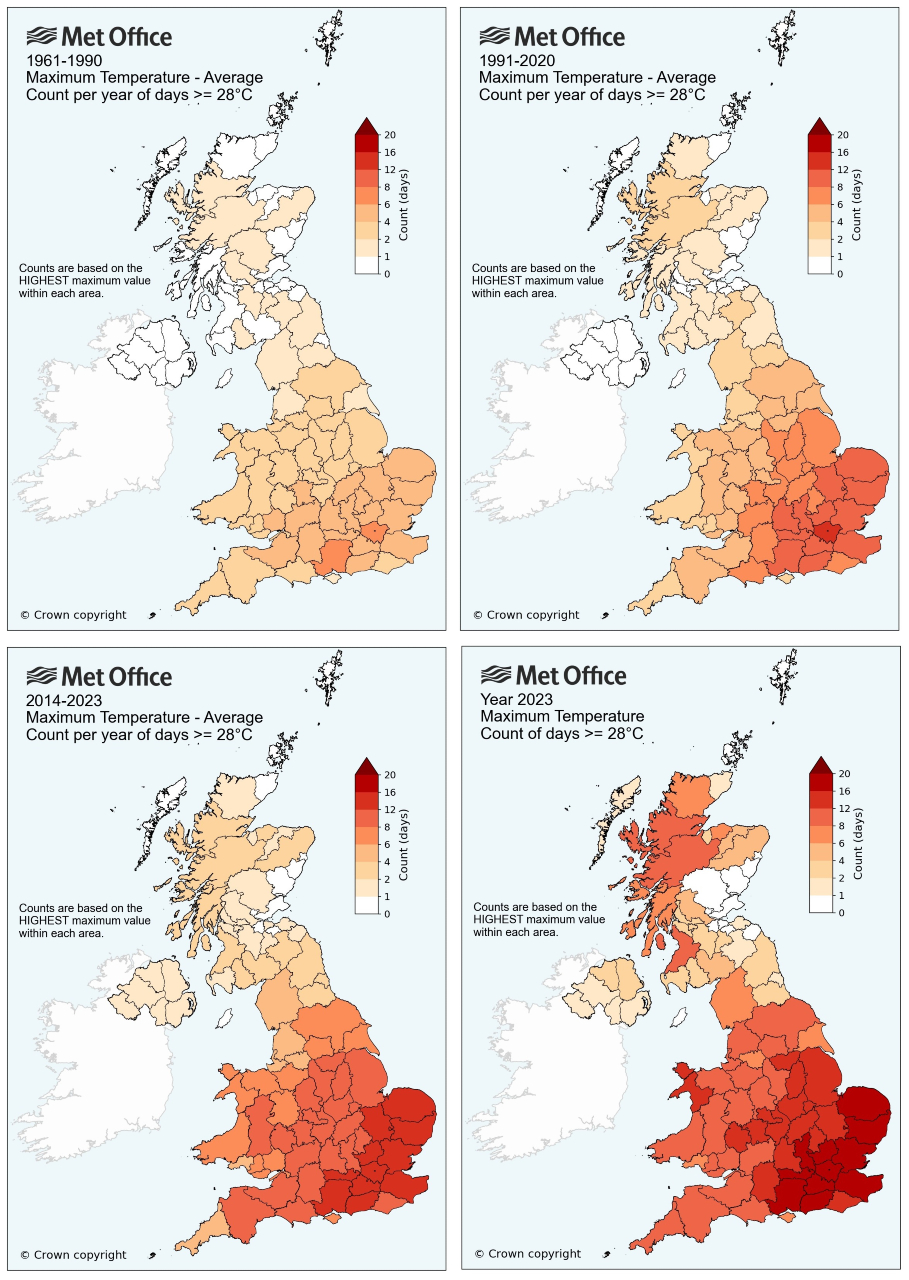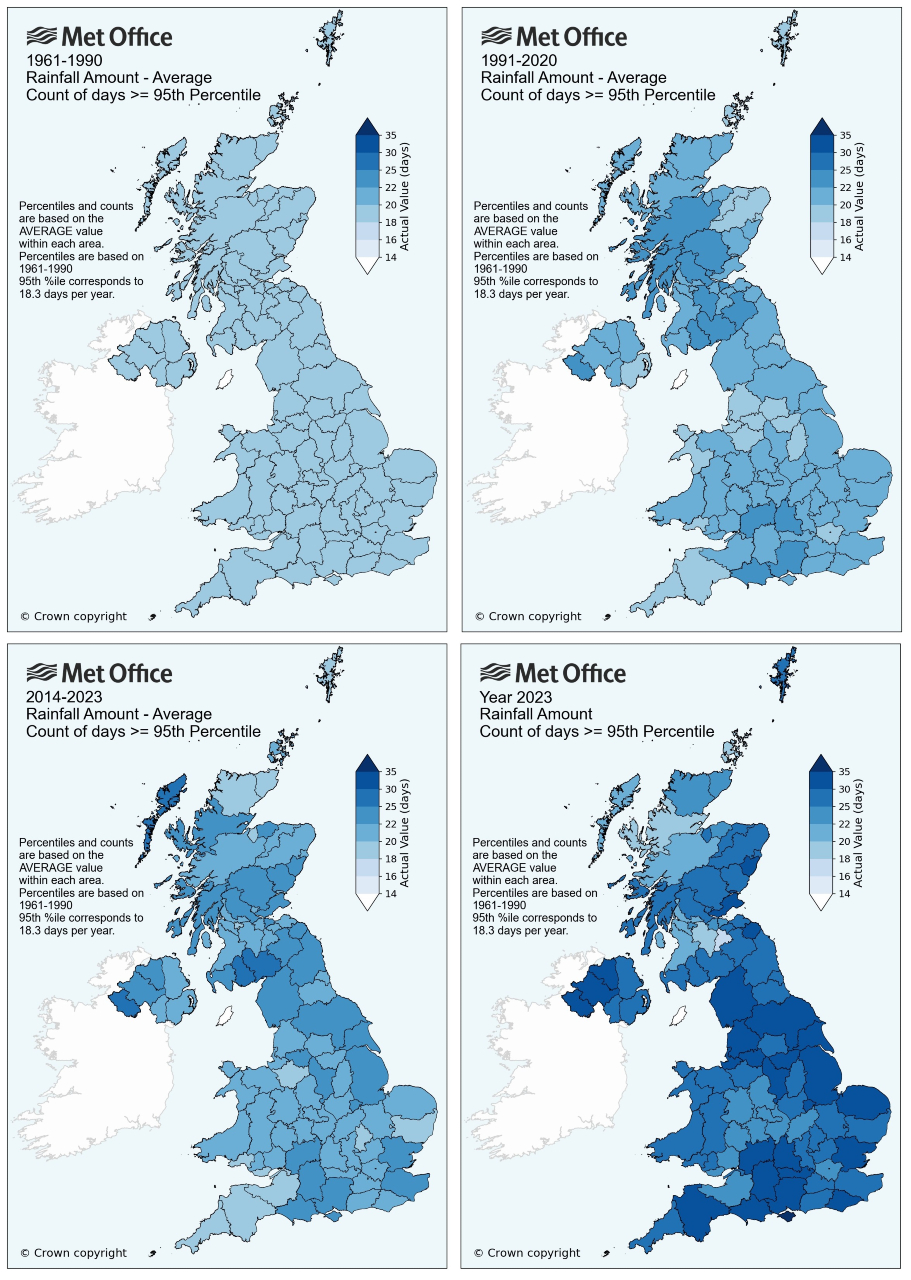Climate change is significantly increasing the frequency and intensity of extreme temperatures in the UK, according to the latest Met Office ‘State of the UK Climate’ report.
This comprehensive review of the UK’s climate in 2023 highlights the growing impact of human-induced climate change on temperature extremes and weather patterns.
More hot days across the UK
Data from the UK’s network of weather stations reveal that the number of days reaching 28°C has surged across nearly all regions.
During the 1961-1990 period, only London and Hampshire recorded six or more days exceeding this temperature.
However, from 2014 to 2023, much of England and Wales experienced at least 12 such days annually, with southeastern counties seeing even higher frequencies.
This increase in ‘hot’ days is consistent across all geographic regions of the UK. The frequency of days with maximum temperatures above 28°C has more than doubled, while ‘very hot’ days exceeding 30°C have more than tripled compared to the 1961-1990 period.
Rainfall extremes are also on the rise
While temperature trends are more straightforward, the report also indicates a rise in extreme rainfall events.
By analysing the top 5% of wettest days from 1961-1990, researchers found a 20% increase in these very wet days during the 2014-2023 period.
Although this increase is not localised to specific areas, it underscores a nationwide trend towards more frequent heavy rainfall events.
Impact of human activities
Met Office scientists conducted several climate attribution studies in 2023 to assess the influence of human activities on extreme weather events.
By comparing current climate conditions with hypothetical scenarios without human-induced greenhouse gas emissions, these studies concluded that events like the record-breaking extreme temperatures in June and the exceptionally warm September were much more likely due to human influence.
A year of notable extreme weather events
The report provides a detailed assessment of the UK’s climate in 2023, a year marked by significant weather anomalies.
It was the UK’s second warmest year on record, the seventh wettest, and the 22nd sunniest, with considerable regional variability. For instance, Wales and Northern Ireland experienced their warmest years on record.
Several months in 2023 were among the top ten wettest since records began in 1836, including March, July, October, and December. Similarly, February, May, June, and September were among the top ten warmest months since 1884.
This pattern of record-breaking warmth and wetness underscores the ongoing shift in the UK’s climate.
The 2023-2024 storm season saw an unusually active start, with seven named storms from September to December.
Storm Babet, in particular, brought prolonged and heavy rainfall, causing significant disruptions, especially in eastern Scotland. Additionally, Scotland recorded its wettest two-day period in October.
Persistent wet and unsettled weather from September to December made this the wettest period since 2000. The year’s highest temperature of 33.5°C was recorded unusually late in September, further highlighting the erratic nature of recent climate patterns.
Rising sea levels
The report also addresses sea level changes, noting that 2023 recorded the highest annual mean sea level at Newlyn since records began.
The National Oceanography Centre (NOC) found that the rate of sea level rise at Newlyn has increased to 4.6 mm per year between 1993 and 2023. Similar trends are observed at other sites around the UK.
Observations in nature
The report includes a section on phenology, the study of seasonal changes in plants and animals.
Data from the Woodland Trust’s ‘Nature’s Calendar’ project showed mixed results for 2023. While some biological indicators were near average or delayed, the Hazel tree had its earliest flowering date on record.
The 2023 leaf-on season was slightly longer than usual, reflecting the complex interplay of temperature and precipitation changes on natural cycles.
Preparing for future climate change impacts
The findings of the report underline the urgent need for adaptation and mitigation strategies to cope with the increasing frequency of extreme weather events.
As human activities continue to drive climate change, the UK must brace for more hot days, heavier rainfall, and rising sea levels.
Understanding these trends and their impacts is crucial for developing effective responses to protect infrastructure, health, and well-being.











